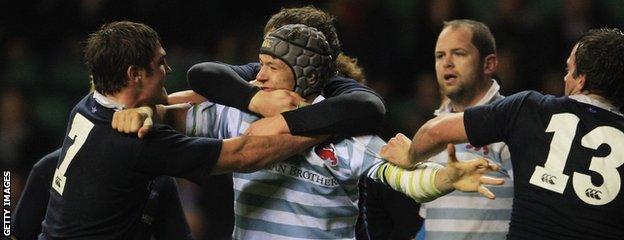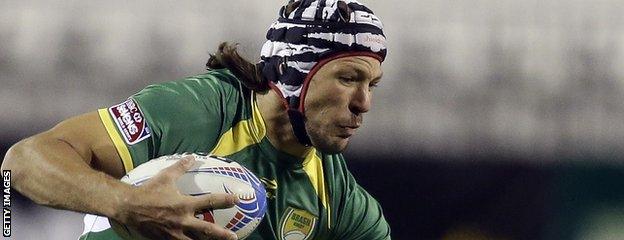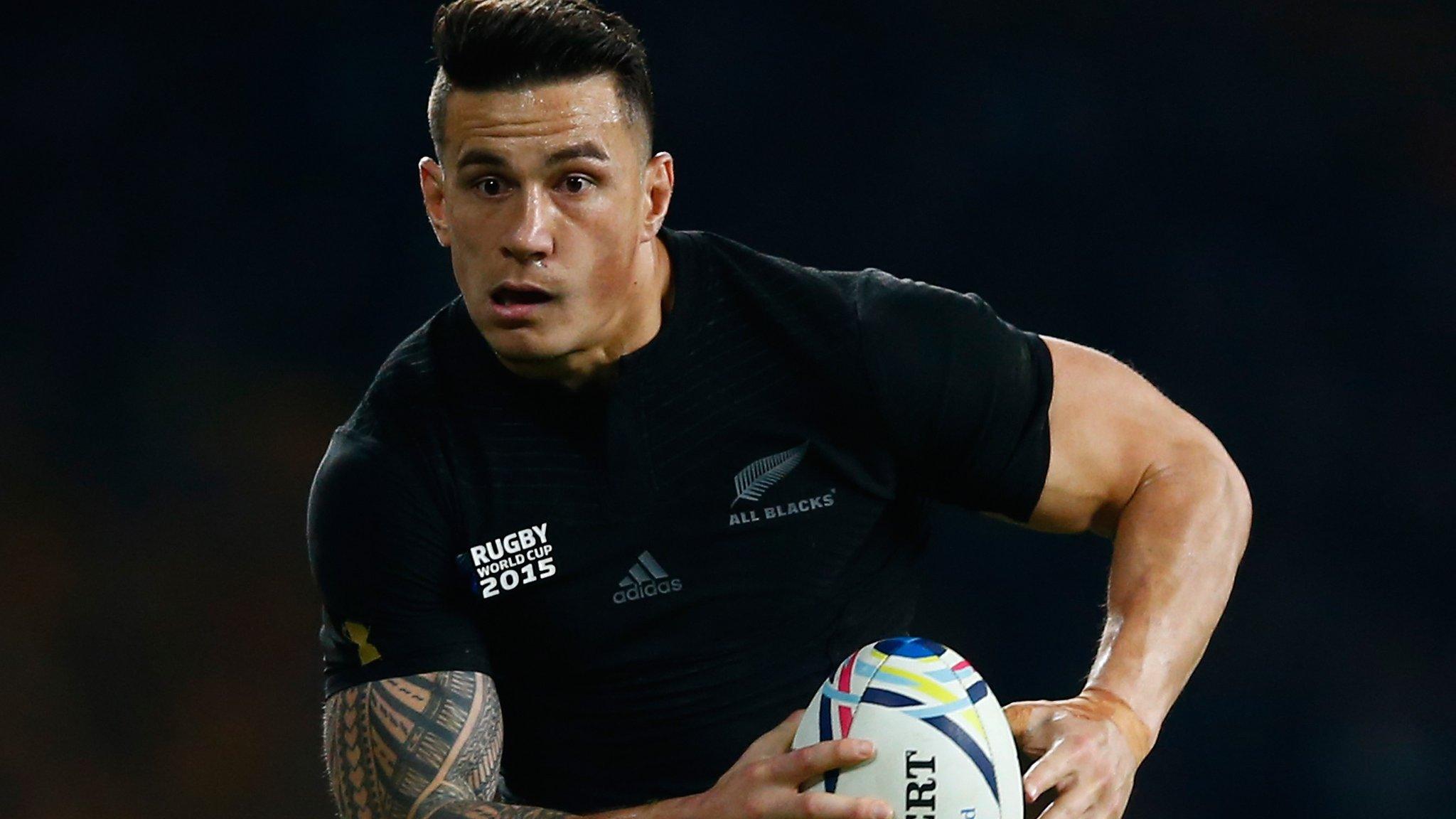Juliano Fiori: The Londoner bidding to play for Brazil at the Rio 2016 Olympics
- Published
Fiori aims to seize Brazil chance
When you think of Brazil you probably think of football, the Copacabana beach, the Amazon rainforest or samba music.
One thing you probably would not think of is rugby.
But not for Juliano Fiori, who is hoping to represent Brazil in the rugby sevens at the Olympic Games in Rio de Janeiro later this year.
So how did a regular bloke born in Hammersmith and raised in Ealing wind up playing rugby for Brazil?
A Londoner with a Brazilian identity
Fiori's father, Jorge, was born in the state of Rio Grande do Sul in Brazil, but political upheaval in the country in the 1960s, and then in Chile in the 1970s, led to the family settling in England in the mid-1970s.
The young Juliano was drawn to Brazilian culture, partly through sport, and has always celebrated his South American roots - first through football and then samba and playing traditional Brazilian drums.
"I've always felt a torn or mixed identity, being a second-generation immigrant, and a connection to something different," the 30-year-old told BBC Sport.
"I didn't have a utopian image of Brazil but had an affinity for the country, the people and the culture.
"I feel as much Brazilian as anything else. I was born and raised here in London but my heart has always been with Brazil.
"There is something deep about Brazil and its people which I have respect for and a certain pride in."
He began playing rugby aged six, with some encouragement from an unlikely source - former Labour Party leader Lord Kinnock, who had links to London Welsh and was a neighbour of the Fiori family in Ealing.
"His son and daughter used to babysit me and my sister," explained Fiori. "Neil said to my dad 'He's quite big. Get him down to the club.'"
Fiori played at London Welsh from under-7 level and, after representing his school, joined Richmond aged 18 as a flanker or number eight.
He played rugby at university at Bristol and then represented Cambridge University in the 2007 Varsity match., external

Fiori (centre, in scrum cap) kicked two conversions as Cambridge beat Oxford 22-16 in the 2007 Varsity match at Twickenham
Linking up with Brazil
Fiori helped Richmond to four promotions but, with injuries curtailing his appearances for the south-west London club, he started playing sevens for Apache Sevens,, external an invitational side.
He first came onto the radar of Brazilian rugby in 2013, when the governing body began to look beyond its shores for talent which could improve its squad and help develop the game in the country.
The prop was invited to train with the national team by coach Andres Romagnoli before a tournament in Rome in 2014 and, after another player was injured, Fiori was included in the squad.
He impressed in Italy and has not looked back, making his debut in the Sevens World Series, external in Dubai that December and representing Brazil regularly on the tour since then.

Fiori made his debut for Brazil in June 2014 and has been a regular for the national side in the Sevens World Series since his first appearance in Dubai in December 2014
Agustin Danza, the chief executive of the game's governing body in Brazil, the Confederacao Brasileira de Rugby (CBRu), says Fiori has brought experience to the national squad.
"Juliano became a reference in our team from day one and fitted in straight away," said Danza.
"He conducts a role which no-one was doing before. He gets the kick-off, is a very powerful ball carrier and takes our team forward.
"He immediately became a figure of leadership within our team and is a key player."
Balancing commitments
Fiori has been combining his job as head of humanitarian affairs at charity Save the Children with training and his international commitments with Brazil.
He has been training on his own in a park near his Ealing home early in the morning before work, focusing on drills to improve his speed and strength, with a further visit to the gym or a training session with Apache Sevens or Richmond in the evening.
But now he is going to take a sabbatical from work to move to Brazil in a bid to reach the Olympics.
"After Dubai the coach said he wanted me to be playing regularly but my family and job commitments were in the UK," said Fiori.
"The last year has been pretty intense, trying to maintain a full-time job, but I have just about managed it."
An Olympic dream
Fiori is now moving to Rio de Janeiro to concentrate on rugby full-time, with his girlfriend Alba joining him in Brazil in the coming weeks.
The national squad, which is based in Sao Jose dos Campos in Sao Paulo state, currently has 23 members and it will be cut to just 12 players for the Olympics.
"It is a once-in-a-lifetime opportunity for me to do something I never dreamed I would get a chance to do, although it was not an easy decision to go away," he said.
"To walk onto the pitch holding the hopes of a nation is something very special, regardless of the event.
"The Olympics would be absolutely unique but I try not to think too much about it right now. I try to think about every day of training and each tournament I need to get through."
Rugby at the Olympics | |
|---|---|
Rugby sevens is making its debut at the Olympics in Rio de Janeiro this year having been approved by the International Olympic Committee's executive board, external in October 2009. | |
The 15-man code has previously featured at four summer Games, with its last appearances in 1924 when the USA won gold. | |
Sonny Bill Williams, a World Cup winner with New Zealand last year, and Australia fly-half Quade Cooper are among the established internationals aiming to play in the sevens tournament in Rio |
Fiori had an operation on a knee injury last October, with his competitive return expected at the World Series in Vancouver on 12-13 March.
With the Brazilians set to compete in Hong Kong, Paris and London before the Olympics, the CBRu has set its men's side the target of reaching the knockout stage in Rio.
"The Olympics is the biggest opportunity we have had to turn rugby into a popular sport in Brazil," added Danza.
"It will put us in the news and allow us to become a more attractive sport for schools, for people who want to practise a new sport, and for sponsors.
"We want to show we have a competitive men's side which can play head-to-head with any team."
- Published4 December 2015

- Published10 May 2013
- Published19 July 2016

- Published15 February 2019
